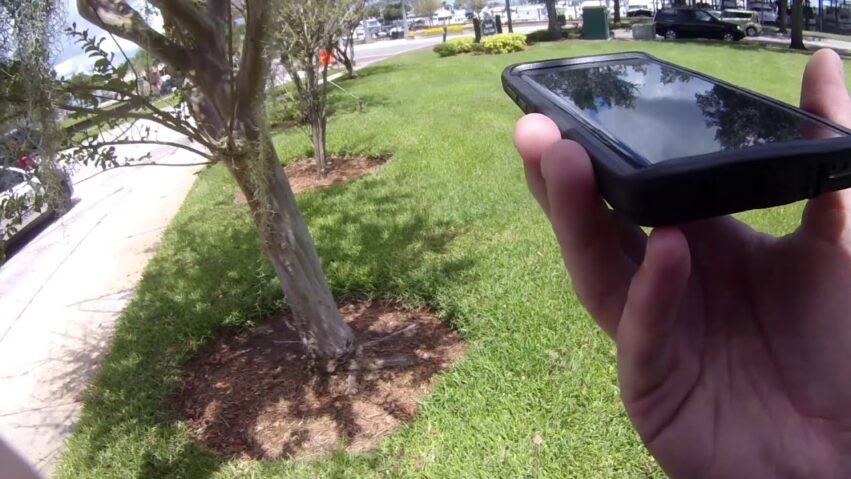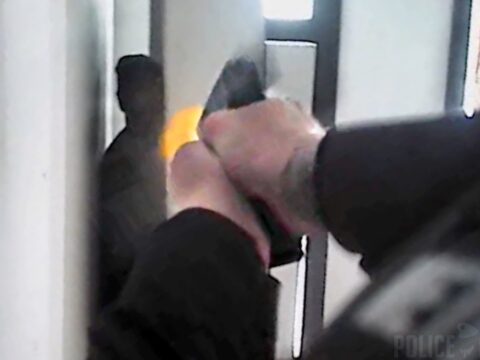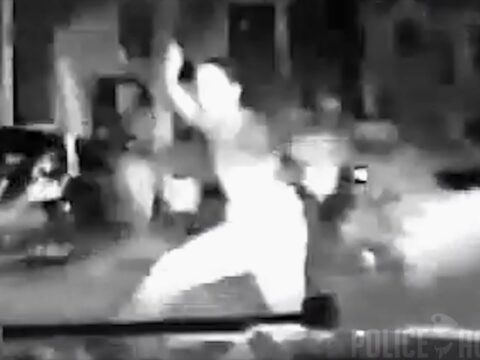At this point we have introduced more than two million people to Jeremy Dewitte, the motorcycle-riding, police-impersonating, funeral-escorting, Florida-Man-to-the-max who recently managed to get himself arrested three times in three months for impersonating a police officer.
But how does that even happen? Because, let’s be real for a minute: that’s not an easy thing to do.
Round one began on September — actually, hang tight- Round one began in 1998, when Dewitte was first arrested for impersonating a police officer. (Details in a public post on Patreon, and coming in a video tomorrow.)
‘Recent round one’ began on September 7, 2019, when officers of the Windermere police department stopped Dewitte and informed him that his motorcycle was coming back as stolen. To say that Dewitte lost his shit would be an understatement. If you thought you saw him flipping out in the first video we published… you haven’t seen anything yet. Dewitte’s bike ended up not being stolen, but Dewitte himself was taken in on charges of resisting without violence, impersonating a police officer, and reckless driving. Dewitte was wearing a body camera during his arrest, and it was seized as evidence. Windermere police applied for a search warrant for its contents, and when the warrant was approved they found a trove of incriminating footage, some of which you have already seen.
Included within that collection of footage were at least two other instances supporting probable cause for impersonating a police officer, and each of those instances was tied to an interaction with the motoring public. Because the offenses all occurred in Orange County, Windermere Police Detective John Allen handed the footage over to Orange County Sheriff’s Office Sergeant Keith Vidler.
While reviewing Dewitte’s body camera video, Vidler noticed that Dewitte appeared to be handling a motorist complaint by phone, and that Dewitte was surreptitiously recording the call — which can be charged as a felony in Florida. In the video, Dewitte identifies himself to the caller as “J†and they begin to converse about her complaint without notification that the phone conversation is being recorded.
“Based on my investigation, there were three separate phone calls between Victim and Dewitte, and at no time did Dewitte inform Victim that the phone call was being recorded nor was there any request for consent to record the phone call.”
“On 10/08/19, Cpl. Ramsey met with Victim. Victim indicated that on 09/26/19, at approximately 11:00 am, she was stopped at a red light when she began to hear sirens approaching from behind her. She observed a black and white motorcycle approach the intersection, enter the intersection, then begin to direct traffic as other marked vehicles with flashing lights entered the intersection. At one point, she was ordered to move from her stopped position by the person on the motorcycle to allow other approaching vehicles to enter the intersection. Victim described the individual as wearing a “police-style” uniform with vest, radio, and gun belt.
“She described the motorcycle as being “police-style†vehicle with mounted flashing lights and sirens. The Victim indicated that she initially believed the person giving her instructions at the intersection was a police officer, and that the commands given to her were lawful and in the execution of the normal duties of a police officer,” becoming suspicious when she noticed the words “Metro State” and that the flashing lights were purple and amber.”
Based upon the above facts, Vidler found probable cause to believe that on 09/26/19, Dewitte violated FS 934.03 by intercepting three phone calls between himself and Victim, without her knowledge or consent, and that Dewitte had impersonated an officer in his earlier interactions with the Victim. The State Attorney agreed, and a warrant was issued for Dewitte’s arrest.
Note:
-Some of the quoted text has been lightly edited to protect the victim’s privacy. Prior to publishing this video, I spoke with her by phone and provided her with an advance copy of the video; she is onboard.
~~~
Real World Police is a proud supporter of the Florida First Amendment Foundation.
~~~
Do you have verifiable inside information on this case? Email tips@realworldpolice.com. Your identity will never be revealed without your consent.
~~~
Follow us on Twitter @realworldpolice
~~~
Music by FesliyanStudios
~~~
Want to help make Real World Police happen and get rewarded for it? Become a supporter on Patreon today! Supporters get access to:
-Exclusive full-length Real World Police videos
-The Roadcam series
-Supporting documentation: police reports, court records, and other investigatory material
-Early access to some videos
-And more!
https://patreon.com/realworldpolice
Prefer nothing?
That works too. There are more than 425 free videos to enjoy!
** (Disclaimer: This video content is intended for educational and informational purposes only) **






















If you missed the first video, check that out at http://tiny.cc/impersonator
This video raises an interesting legal question: can I publish an illegally recorded phone call?
Now, I should say off the bat that the question is (fortunately) not relevant here, because I was able to get the victim's permission. We spoke by phone and I sent her a copy of the video to view in advance. It has her blessing.
But what if I hadn't been able to get in touch with her? Or if she had said no. What then?
One consideration is the content of the call itself, and whether it might be protected as "private facts" about which the victim had a reasonable expectation of privacy. Based on the content of the call, that doesn't appear to be a concern here.(1)
The bigger potential issue is the distribution of a recording that was made without the knowledge and consent of all parties. Florida makes it a crime to intercept or record a "wire, oral, or electronic communication" unless all parties to the communication consent. See Fla. Stat. ch. 934.03. The crime is serious, too. Dewitte is facing felony charges for this recording. And the statute? It doesn't end there. Guess what's also a crime?
"…(c) Intentionally discloses, or endeavors to disclose, to any other person the contents of any wire, oral, or electronic communication, knowing or having reason to know that the information was obtained through the interception of a wire, oral, or electronic communication in violation of this subsection."
Doesn't sound too promising, right?
Well, the United States Supreme Court tackled this issue head-on in a 2001 case captioned Bartnicki v. Vopper.
BARTNICKI et al. v. VOPPER, aka WILLIAMS, et al.
ON WRITS OF CERTIORARI TO THE UNITED STATES COURT OF APPEALS FOR THE THIRD CIRCUIT
[May 21, 2001]
(Recommended: Hear Justice Sandra Day O'Connor announce the opinion of the court. Click http://tiny.cc/oconnor then click the "opinion announcement" button on the left.)
"Justice Stevens delivered the opinion of the Court.
These cases raise an important question concerning what degree of protection, if any, the First Amendment provides to speech that discloses the contents of an illegally intercepted communication. That question is both novel and narrow. Despite the fact that federal law has prohibited such disclosures since 1934, this is the first time that we have confronted such an issue.
The suit at hand involves the repeated intentional disclosure of an illegally intercepted cellular telephone conversation about a public issue. The persons who made the disclosures did not participate in the interception, but they did know–or at least had reason to know–that the interception was unlawful. Accordingly, these cases present a conflict between interests of the highest order–on the one hand, the interest in the full and free dissemination of information concerning public issues, and, on the other hand, the interest in individual privacy and, more specifically, in fostering private speech. The Framers of the First Amendment surely did not foresee the advances in science that produced the conversation, the interception, or the conflict that gave rise to this action. It is therefore not surprising that Circuit judges, as well as the Members of this Court, have come to differing conclusions about the First Amendment’s application to this issue. Nevertheless, having considered the interests at stake, we are firmly convinced that the disclosures made by respondents in this suit are protected by the First Amendment."
The Attorney General of Florida has written in agreement
"The First Amendment takes priority over wiretap laws to protect a person who discloses the content of a telephone conversation that was illegally intercepted and taped by someone else, the U.S. Supreme Court held.
In a 6-3 ruling, the court said First Amendment protections prevent a Pennsylvania radio host from being held liable for broadcasting a recording of a cellular telephone conversation. The host received a copy of the conversation between a labor union president and his chief negotiator, but did not know who intercepted the conversation or recorded it. The union negotiator sued, claiming radio stations that broadcast the conversation violated state and federal laws, but the broadcasters said they were protected by the First Amendment. The Supreme Court agreed that when a media outlet obtains the information legally — even though the information was gathered illegally by someone else — it may not be punished for broadcasting or publishing the information concerning a matter of public concern.
“(A) stranger’s illegal conduct does not suffice to remove the First Amendment shield from speech about a matter of public concern,†Justice Stevens wrote for the court. “In this case, privacy concerns give way when balanced against the interest in publishing matters of public importance. … One of the costs associated with participation in public affairs is an attendant loss of privacy.â€
Good news! ðŸ‘(2)
~~~
(1)Â
Publication of private facts is something all journalists need to be very careful about, as in most states, you can be sued for publishing private facts about another person, even if those facts are true.
The term "private facts" refers to information about someone's personal life that has not previously been revealed to the public, that is not of legitimate public concern, and the publication of which would be offensive to a reasonable person. For example, writing about a person's HIV status, sexual orientation, or financial troubles could lead to liability for publication of private facts.
However, the law protects you when you publish information that is newsworthy, regardless of whether someone else would like you to keep that information private. In addition, the law protects you if you publish information already exposed to the public eye and particularly so if that material was obtained from publicly available court records.
(Despite the law's substantial protections for legitimate reporting on matters of public interest, it is a good practice to obtain consent before publishing sensitive private information about someone.)
For more information visit the Digital Media Law Project – http://tiny.cc/privatefacts
(2)
Well… sort of.
A University of Boston School of Law faculty article by Eric Easton titled "Ten Years After: Bartnicki v. Vopper as Laboratory for First Amendment Advocacy and Analysis" indicates that in practice, the court's opinion in Bartnicki is being construed narrowly. According to Easton, "In no case reported to date has the holding in Bartnicki been applied to reach a similar conclusion in an analogous case."
~~~
Don't get legal advice from YouTube comments.
This guy is the biggest yard ever I can't believe people don't call the fbi on him because did literally just buy a bunch motorcycles and either got em kitted out or literally kitted them all himself my guess the latter with a bunch of Alibaba purchases a vinyl guy working out of single roll up garage I never saw a Hurst anywhere
She must not have any sons or grand sons because. Nvm. Imma just say B CUZ!!! 😳😳😤😤🤬🤬
Snarky, snarky, you’re getting snarky!! J has no comeback and it’s hilarious!!! This woman is my hero!!!
Jeremy screwed himself over with his pride and his big mouth. If he was calm and courteous she would never have pressed charges against him. He kept calling her back and then cursed her out! lol Idiot.
Please, educate me, is it illegal to record a phone conversation? on which case it is legal?
As one guy said. The real life buzz lightyear. Lol. I really laugh. In his movie when he pounded on a car lol
Call this freak what you want but he certainly has persistence, the sheer narcissism he has and his determination is so bad a normal person would have given up to common sense a long long time again.
He is one dangerous individual and he will kill before his 'career' is over.
The only think that will stop him will be him shooting and killing someone.
That's quite a sad thought isn't it.
(That was a rhetorical question, obviously)
Edit:
This just in – did anyone else recognise his phone's ring tone?
Yup, it's the phone ringtone made famous by the action/drama show 24, where Keifer Sutherland's one hell of a kick ass hero.
I dread to ask this but does that mean he's looking for a promotion?
"Uh ohhh ok"
And the continues to let him stay on the road doing this he needs 10 years without parole.
0:12 that is a terrifying mugshot. good god that was one out of date printer
This guy is just too much to handle. I just want to punch my monitor every time I watch these videos. Dewitte keeps calling this woman back harassing her after hanging up, and his first response is: "Oh, I'm not harassing you!" I love how he just decides what's happening in stark contrast to the reality.
Shouldn’t he be charged with harassment as well since he kept calling back
The anti-hero we never knew we needed
My uncles funeral had 750 cars. It went fine without these idiots.
This guy makes Joe Exotic look normal.
“Metro state†😂🤣😂🤣 what the hell is metro state… literally trying to sound like law enforcement
Jeremy is in need of a considerable ass kicking…maybe more than one because unless he humbled…his funeral "protection" services is going to get people killed.
The state should have cancelled this this jerks “license or authority†practice of traffic control. If this clown had ever made it to a police force, he would had been one incredible jerk issuing tickets to his own shadow.
Who did he wiretap ? I thought wiretapping was listening to a conversation this guys in a conversation.
His officers? Lol
He's lieing his ass off. He says he had to push himself off the vehicle. The ex employee said he edited the video to make the officer look bad under oath
Hes a control freak.
The Internet doesn't make people smarter, it makes stupid people more accessible.
He has bigger ego than Kanye. He had to call the lady to say his piece. What a low life.
This guy is a gift that just keeps giving. How many videos are on YouTube about this guy. And he needs to register and if you don't know what that means don't go trick-or-treating Halloween around his house and he lives in my town. This rabbit hole is deep you can easily lose a few hours learning about Jeremy. And you won't have anything of value to show for it.
I don’t get it. The guy is a dink, but he’s apparently licensed to do this. It seems like he’s being harrassed by the PD there
I can’t stand this guy, but this lady is an idiot. Just bc she doesn’t know the law in Florida doesn’t change the law
The way he talked to that woman was very disrespectful!
"Listen buddy don't get sassy with me "
😂
3:46
Omg
Is that Spanish moss
On that tree
It's so expensive here in Australia 🇦🇺
Far out
Commiting a crime is one thing.
But commiting a crime and being so stupid to record it, is another level.
I think Jeremy is related to Frank Rizzo !
Trying his best to sound like a detective or an officer to intimidate this person! He needs a lobotomy of what's left in his head…
He wanted to speak professionally.
Later he says bitch. ðŸ˜
State agent.
At what we do “ well you weren’t doing it “ lmfaoooooooo
IM OUT OF GASSSSSS!!!
This guy needs to be jailed or never be allowed to do anything like this again
Makes all the sense now..he’s a freakin Aquarius we jus don’t give af lol
Wait, he said he’s the owner of the company, but he also said he has a supervisor?
classic ASPD.
This is a very rare occurrence not one sarg was said
When they hang up on him it eats at his soul
Jeremy Dewitte is Criminally obnoxious. I’m glad he’s serving time
“Well you weren’t doing it†….lol
Massengill-One is moving
I hate that guy so much.
The next time I'm in Orange County, Florida, I know to ignore amber/purple lights with "Metro-State" on the sides of the vehicles, and drive around them when they stop in the middle of an intersection as they have no right to stop traffic like they do.
He is a state certified lunatic. Also, love how arrogant him and his employees are. So glad they are all shut down
He is completely harassing this person. WTF